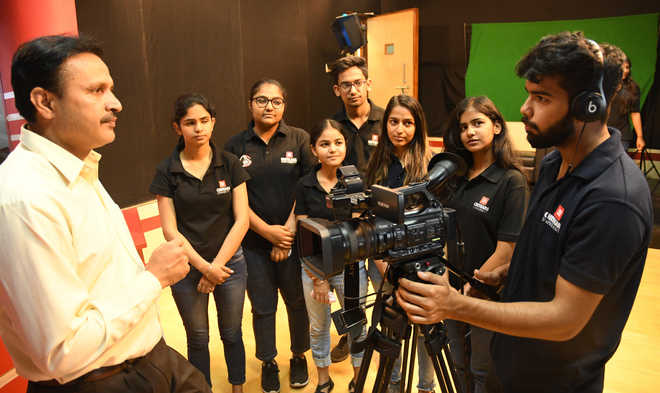
Gauri Chhabra
A career in media can be pursued after either a master’s degree in Mass Communication or a PG Diploma in Mass Communication and other related fields like TV and radio, PR, advertising, filmmaking etc. Most students aspiring to get into this field are in a dillemma after graduation when it comes to choosing the right course. Should you be going in for a degree or a diploma? What is the difference between the two? Do both these paths converge at a certain point? These are some of the key questions that they grapple with. If you are in the same boat then remember that the bottomline here is to keep your sight on your end goal. You have to be clear about what field of mass communication yuo are interested in and are cut out for before deciding about the right course. Those who have set their eyes on joining the broadcast media, should ideally look for a PG diploma in TV and Radio as this way they will be moving towards their goal and getting equipped for the job roles they would be applying for. Similarly those interested in filmmaking should choose a related course even if it doesn’t have the “degree” tag. Let us understand the difference between the two courses so that you can make an informed choice:
MA Mass Communication
Master’s in Mass Communication is of two years duration. Whether its print or audio-visual journalism or corporate communication or radio production, a student learns everything in it. The basic eligibility for admission to MA Mass Communication is a bachelor’s or equivalent degree in any stream. A post-graduate degree in mass communication opens up career avenues in many media-related fields. Degree holders can find jobs in areas such as print journalism, public relations, broadcast journalism, advertising etc.
Institute watch
There are many institutes in India that offer a master’s in mass communication. Some of these are:
- Panjab University, Chandigarh
- Punjabi University, Patiala
- GUru Nanak Dev University, Amritsar
- Jamia Millia Islamia University, Delhi
- Institute of Mass Communication and Media Technology, Kurukshetra
- MICA, Ahmedabad
- Chitkara University, Banur
- Chandigarh University, Gharaun
Earning a master’s degree in communication can help prepare you for jobs in corporate communication, journalism, mass media, politics, higher education, besides a wide range of other fields. Students who are already employed can use the skills they acquire to advance in their current careers, with some leadership positions even requiring a master’s in communication.
A master’s in communication can also prepare students for doctoral studies and a career in higher education, where you will spend time conducting research and educating students.
PG Diploma
Post Graduate Diploma or PG Diploma in Mass Communication is of recent origin and is fast overtaking the master’s course. This course is also offered by various government universities and institutes.It’s a diploma which one can pursue after finishing bachelor’s degree and in most institutes it is offered in different specialisations like PR, advertising, media management, TV and Radio journalism, digital journalism etc. Graduates from any stream can pursue this course but at the end of the course, they would be conferred with a diploma and not a degree.
Institute watch
Indian Institute of Mass Communication, IIMC, New Delhi offers postgraduate diploma courses in Journalism (English/Hindi/Radio & Television/Oriya) as well as Advertising & Public Relations.
- Symbiosis Institute of Media & Communication, Pune.
- Asian College of Journalism (ACJ), Chennai, offers a one-year postgraduate diploma with specialisation in four streams - Television, Print, New Media and Radio.
- Distance education universities like Indira Gandhi National Open University (IGNOU) is also offering a one-year diploma course in Mass Communication.
Getting in
Most of the universities and institutes hold their individual tests to slect students. For instance, the test for admission to IIMC would be on May 25-26, 2019. The entrance exam for diploma in mass communication tests a candidate’s general knowledge and aptitude. On the basis of an aspirant’s score/rank in IIMC Entrance exam, he/she can secure admission at any IIMC campus. Some institutes also hold interviews for selection of candidates for mass communication courses. A minimum score of 50 per cent in bachelor’s degree is mandatory. Some universities may also keep 60 per cent as the cut off for eligibility.
Lateral entry
For direct admission to the second year of the master’s programme, a student must have a PG Diploma in Journalism, Mass Communication, Advertising or Public Relations from a recognised Indian University. However, a lateral entry in MA course is not eligible to apply for UGC NET examination. There are certain institutes like the following that also admit student laterally in the second year of the master’s programme.
- RK Films and Media Academy, New Delhi
- Jaipur National University
- NCSM, New Delhi
- Directorate of Distance Education, Guru Jambeshwar University of Science and Technology, Haryana
- Dibrugarh University, Assam


























